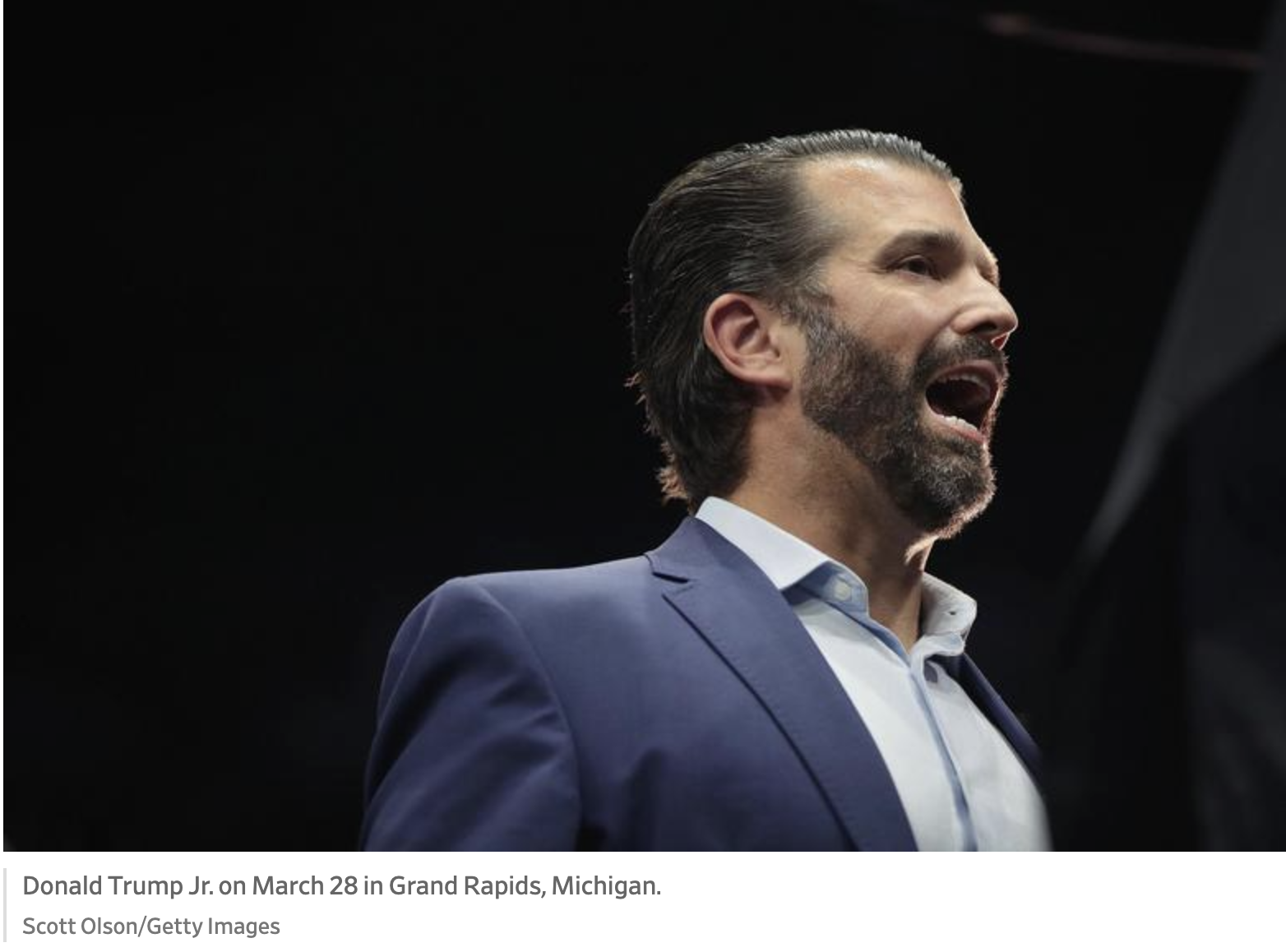Robert Mueller let Donald Trump Jr. off the hook too easily for potential campaign finance violations that arose from the June 2016 meeting in Trump Tower with Russian operatives. Mueller’s questionable exercise of prosecutorial discretion is bad news for how campaigns and foreign entities might conduct themselves in the run-up to the 2020 elections.
DIRECT LINK TO RICHARD L HANSEN’S PIECE ON SLATE
Like many others, I am still poring over Mueller’s 448-page partially redacted report. My initial general impression of Volume 1—the part dealing with Russian interference in the 2016 elections and the connections between Trump—is that Mueller and his team did a thorough and fair job in investigating what happened and in describing the facts. But on the potential campaign finance violations, Mueller fell short in numerous ways.
I have described the circumstances of that Trump Tower meeting before: During the 2016 presidential campaign, the president’s son Donald Trump Jr. got an email from his friend Rob Goldstone stating that the “Crown prosecutor of Russia” had “offered to provide the Trump campaign with some official documents and information that would incriminate Hillary and her dealings with Russia and would be very useful to your father.” This “high level and sensitive information” was being presented as “part of Russia and its government’s support for Mr. Trump.” Trump Jr. replied almost immediately: “If it’s what you say I love it especially later in the summer.” The subsequent meeting, held on June 9, 2016, included Trump Jr.; Trump’s campaign manager, Paul Manafort; the president’s son-in-law Jared Kushner; Goldstone; and a number of Russians connected with the Russian government.
Federal law makes it a potential crime for any person to “solicit” (that is, expressly or impliedly ask for) the contribution of “anything of value” from a foreign citizen. The offer of such opposition research qualifies as something of value for these purposes, a point the special counsel acknowledged based on prior cases and Federal Election Commission rulings.
We now know the special counsel considered whether Trump Jr. and Manafort committed such a crime before ultimately declining to prosecute. We also now know that Mueller made some key errors during that decision-making process.
To begin with, the special counsel’s report says that Trump Jr. “declined to be voluntarily interviewed” about the meeting. The special counsel should have called Trump Jr. before the grand jury, as he did with other witnesses. It seems likely that he declined to do so as not to incur the wrath of the president.
Trump Jr.’s grand jury testimony would have been especially important given one of the key reasons Mueller declined to prosecute the president’s son for this crime: lack of willfulness. In order for a campaign finance violation to constitute a criminal offense (rather than a civil problem handled with fines by the Federal Election Commission), one must act willfully. Willfulness is a question of mental state. Getting Trump Jr. before a grand jury would have been a great way to get at his mental state, because he would have been testifying under the risk of perjury. This was a huge missed opportunity for Mueller.
Mueller made some other questionable choices. While Trump Jr. could have been charged with illegally coordinating with the Russians to make an illegal foreign expenditure, Mueller describes the law defining coordination as too uncertain. In fact, as Common Cause’s Paul S. Ryan explains in this thread, there is both a federal statute and case law defining the term, and Trump Jr.’s conduct seems to fall within it.
Mueller also made the ridiculous argument that it is possible Russian “dirt” on Clinton could have been worth less than $25,000, the threshold to punish Trump Jr.’s cooperation as a felony. Really?
Further, Mueller said that a Trump Jr. prosecution would have raised “First Amendment questions” and “could have implications beyond the foreign-source ban.” To begin with, a First Amendment defense of Trump Jr. is bogus. As I explained in Slate, the main First Amendment argument is that a ban on soliciting foreign political contributions is overly broad and could apply any time a foreign individual gives any information to a political campaign.
But Trump Jr. was a major campaign official meeting with representatives from a foreign government that were offering “dirt” on the campaign’s opponent. As I wrote, “To let someone off the hook who solicited ‘very high level and sensitive information’ from a hostile government because there may be cases in which information from a foreign source does not raise the same danger to our national security and right of self-government is to turn the First Amendment into a tool to kill American democracy.”
Further, even if Mueller believed there were First Amendment questions in play, he should have left that for the courts to decide given the strong national security interests at stake here. Mueller offered no First Amendment argument in his report. He merely flagged the issue and never provided any analysis to back up the First Amendment claim.
I’m afraid that this flagging of the issue does more harm than good. Mueller has now given campaigns credible reason to believe they can accept help from foreign governments because they may have a constitutional right to do so. That’s even more troubling for what it says about 2020 than what it says about 2016.
Support our journalism
Help us continue covering the news and issues important to you—and get ad-free podcasts and bonus segments, members-only content, and other great benefits.


 By
By
You must be logged in to post a comment Login